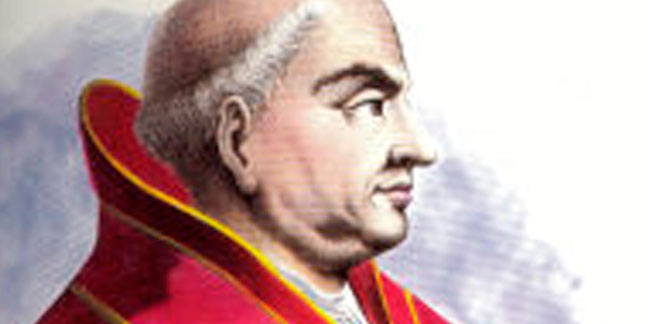 Pope St. Martin I died a martyr for defending the faith against the influences of imperial power and a popular heresy of the time.
Pope St. Martin I died a martyr for defending the faith against the influences of imperial power and a popular heresy of the time.
He was born in the Italian town of Todi and served as nuncio to Pope Theodore I in Constantinople. He was named successor to Theodore on July 5, 649 – without getting prior approval from the Roman emperor Constans II. This independent act so enraged the emperor that he refused to acknowledge Martin as the legitimate pope.
The emperor was further angered when Martin convened a synod at Lateran to combat the Eastern heresy of Monothelitism, which held that Jesus did not have a human will, only a divine will. Constans did not support Monothelitism per se, but he ordered that no one could discuss Jesus' will at all. The Lateran council affirmed that Jesus had two natures and two wills, human and divine. The council of 105 bishops also condemned the emperor's command to avoid discussion on the topic.
In the summer of 653, Constans ordered Martin to be kidnapped, arrested and brought to trial in Constantinople. The emperor's guards boldly entered the Lateran, arresting the bedridden Martin and tossing him on a ship for the three-month voyage to trial in Constantinople. When he arrived in Constantinople, Martin was sickly – racked with dysentery and disabled by gout. He was thrown into solitary confinement in a freezing and filthy cell.
On Dec. 19, 653, Martin was brought to trial on trumped-up charges of treason and sacrilege. The pope, near death and realizing his position futile, only laughed at the ridiculous accusations and begged the emperor to excuse the fumbling witnesses before they added perjury to false witness.
Constans pronounced a predetermined verdict of guilty on the pontiff and sentenced him to public flogging and execution. After the sentence was read, Martin was taken to a terrace of the palace near the imperial stables where crowds had gathered.
The puppet judge who had presided at the tribunal mocked Martin, saying, "You see how God delivered you into our hands. You were against the emperor, and thus has God abandoned you."
Then the soldiers slashed his clothing and took away his shoes. He was delivered to the prefect of the city with the order of execution. The judge tried to incite the populace to anathematize Martin, but the mob remained silently gazing at the ground. After a while, the crowd dispersed.
The soldiers stripped the pope of his shredded clothes and dressed him in a grotesque tunic, open on both sides, to humiliate him. They put an iron ring around his neck, with a rope attached to it, and dragged him back to prison. In the freezing cold, Martin trembled and awaited death.
It was only by the dying Patriarch Paul's intercession that Martin's sentence of public execution was commuted to banishment. He was exiled to Crimea, where he died Sept. 16, 655, suffering from cold and starvation.
Today Martin is venerated as a saint by both the Catholic and Orthodox Churches.
— Sources: "The Popes: A Papal History," by J.V. Bartlett, and www.catholicnewsagency.com